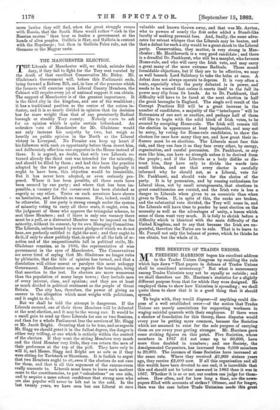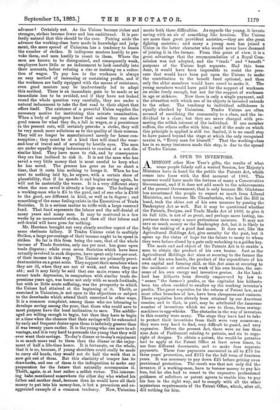THE BENEFITS OF TRADES. UNIONS.
MR. FREDERIC HARRISON began his excellent address to the Trades Unions Congress by recalling the rale which lays down "That papers in defence of Trades Unions shall be considered unnecessary." But what is unnecessary among Trades Unionists may not be equally so outside ; and we shall therefore use Mr. Harrison's statistics for a slightly different purpose from that for which they were designed. He employed them to show how Unionism is spreading ; we shall quote them to show that it is a good thing that it should spread.
To begin with, they would dispose—if anything could dis- pose of a well established error—of the notion that Trades Unions are merely associations for supporting workmen in waging suicidal quarrels with their employers. If there were a shadow of foundation for this theory, these disputes would every year be getting more common, because the Societies which are assumed to exist for the sole purpose of carrying them on are every year getting stronger. Mr. Harrison gave some striking figures on this point. Five Societies, whose members in 1867 did not come up to 60,000, have more than doubled in numbers ; and one Society, the Amalgamated Carpenters, has increased from 8,000 members to 20;000. The incomes of these Societies have increased at the same rate. Where they received £1,000 sixteen years ago, they receive £2,000 now. If all this organisation and all this wealth have been devoted to one end, it is incredible that this end should not be better answered in 1883 than- it was ht 1867. Whether it is so or not, our readers can judge for them, selves. How often, and for how long a time, are the- new- papers filled with accounts of strikes? Oftener, and:fel-longer, than was the case before Trade- Tifeioni.sm made- this great
advance ? Certainly not. As the Unions become richer and stronger, strikes become fewer and less embittered. It is per- fectly natural that this should be the case. Putting aside the advance the working-class have made in knowledge and judg- ment, the mere spread of Unionism has a tendency to lessen the number of strikes. It indisposes masters hastily to pro- voke them, and men hastily to resort to them. Where the men are known to be disorganised, and consequently weak, employers have little or no inducement to look carefully into their accounts, before refusing a rise or insisting on a reduc- tion of wages. To pay less to the workmen is always an easy method of increasing or sustaining profits, and if the workmen are badly equipped with the means of resistance, even good masters may be inadvertently led to adopt' this method. There is an immediate gain to be made or an immediate loss to be avoided, and if they have not looked round the whole question very carefully, they are under a natural inducement to take the first road to their object that offers itself. The existence of a powerful Union supplies the necessary motive for instituting this minute examination. When a body of employers know that unless they can show good reason for what they do, a fall in wages, or a persistence in the present rate, will certainly provoke a strike, they will be very much more solicitous as to the quality of their reasons. They will no longer be manufactured merely for home con- sumption ; they must be of a kind that will stand the wear- and-tear of travel and of scrutiny by hostile eyes. The men are under equally strong inducements to caution of a not dis- similar kind. They have more to risk, and by consequence they are less inclined to risk it. It is not the man who has saved a very little money that is most careful to keep what he has saved. The process has gone on for so short a time, that it costs him nothing to forego it. When he has next to nothing laid by, he argues, with a certain show of plausibility, that if he spends it and begins saving again, he will not be materially the worse. It is a very different story when the sum saved is already a large one. The feelings of a working-man who is £5 to the good, and of one who is £100 to the good, are different in kind, as well as in degree ; and something of the same feeling exists in the Executives of Trade Societies. It is a serious matter to trifle with a large reserved fund. That fund represents the labour and the self-denial of many years and many men. It may be scattered in a few weeks by an unsuccessful strike, and then all that labour and self-denial will have gone for nothing.
Mr. Harrison brought out very clearly another aspect of the same obstinate fallacy. If Trades Unions exist to multiply Strikes, a large per-centage of their income ought to be spent in strikes. So far is this from being the case, that of the whole income of Trade Societies, only one per cent. has gone upon trade disputes ; while even seven Societies which have been actually involved in such disputes, have spent only two per cent. of their income in this way. The Unions are primarily provi- dent societies on a great scale. They support their members when they are ill, when they are out of work, and when they are old ; and it may fairly be said that one main reason why the recent trade depression, in comparison with similar trade de- pressions years ago, was borne not only with so much.fortitude, but with so little acute suffering,- was the prosperity to which the Unions had attained at the beginning of it. Thrift, as exercised in Unionism, is not open to the objections or subject to the drawbacks which attend thrift exercised in other mays. It is a common complaint, among those who are labouring to develope saving among the poor, that those who could save to most purpose have the least inclination to save. The middle- aged are willing enough to begin, bat then they have to begin at a time when the chances that their savings will be exhausted by early and frequent drains.upon them isinfinitely.greater than it was twenty years earlier. It is the young who.can save to ad- vantage, and it is very hard to persuade the young that they will -ever want their savings. To-day's dinner or to-day's enjoyment is so much•more real to them than the dinner or.the enjoy- ment of half a life-time hence. It is fortunate, on the whole, that it is so, because, if young shoulders could really be made to carry old heads, they would not do half the work that is _now got out, of them. But .this elasticity of temper has its .drawbaelm, and one of them is the indisposition to make . any
!preparation for the future that naturally accompanies it. Thrift, again,.is at best rather a selfish virtue. The interest-
ing babe:mentioned somewhere the other day who wished his father.and.mother dead,,because then he would have all their
• money to put into his money-box, is but a precocious and ex- aggerated example of a common tendency. Now, lJnionism meets both these difficulties. As regards the young, it invests saving with an air of something like heroism. The Unions are more than great provident societies,—they are also great fighting societies ; and many a young matt has joined a Union in the latter character who would never have dreamed of joining it in the former. From this point of view, it bra great advantage that the recommendation of a Royal Com- mission was not adopted, and the " trade " and " benefit " purposes of the Unions kept separate. Had this been done, it would have been impossible to resist the pres- sure that would have been put upon the Unions to make the contribution to the benefit fund optional, and then only the older members would have cared to make it. The young members would have paid for the support of workmen on strike freely enough, but not for the support of workmen in age or sickness. Now there is only a single payment, and the attraction with which one of its objects is invested extends to the other. The tendency to individual selfishness is equally checked by Unionism. Trades Unions are often accused of sacrificing the community to a class, and the in- dividual to a class ; but they are never charged with pro- moting the selfish interest of the individual. If one member suffers, the others suffer with him ; and if the scale on which this principle is applied is still too limited, it is no small step to have passed beyond the stage at which the only recognised maxim is, " Every man for himself." That the working-class has in so many instances made this step, is due to the spread of Trades Unions.



































 Previous page
Previous page